Disclosure: We may earn money or products from the companies mentioned in this post.
When you are considering getting your first pet rabbit, one of the things that you must keep in mind is that pet rabbits can live longer than many people think. In addition, there are a number of things that you can do for your bunny so they live even longer.
Rabbits are often believed to have shorter life spans than other pets because of their small stature but this is a myth. Any domestic rabbit that is given enough excellent care will be able to live a long life, sometimes living for a decade or more.
In general, domestic pet rabbit breeds are not predisposed to the array of illnesses of physical ailments that are so predominant in many breeds of purebred dogs or cats, which also helps them live longer than you might expect.
Pet rabbits live for 7 to 12 years on average, though pet rabbits have been known to live for as long as 16 years. A rabbit’s lifespan varies based upon breed, size, housing, stress levels, diet, and medical care.
We should also note that the lifespan of rabbits has drastically increased over the past fifty years as we began to think of them as pets. Before their entry into the realm of pets, rabbits were bred solely for their fur and meat which certainly decreased their life expectancy.
In this article, I will be discussing all that you need to know about rabbit life spans including a list of rabbit breeds and their respective average life spans.
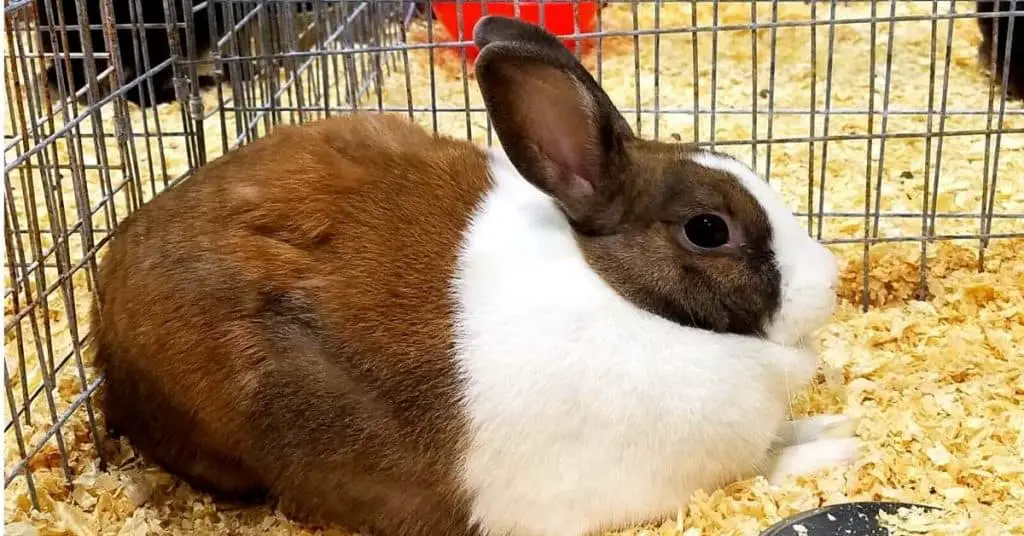
Table of Pet Rabbit Life Span By Breed
There are many breeds of domestic rabbits today. In the table below, I have listed 50+ of the most popular rabbit breeds and their known life spans. It can also be observed, however, that rabbit life spans are relatively long even in breeds that carry the dwarfism gene which does introduce potential physical ailments.
| Breed | Max Weight | Lifespan |
|---|---|---|
| Alaska | 9 lbs | 7 to 10 years |
| American | 12 lbs | 5 to 10 years |
| American Chincilla | 12 lbs | 5 to 8 years |
| American Fuzzy Lop | 4 lbs | 5 to 8 years |
| American Sable | 9 lbs | 5 to 8 years |
| Argente Brun | 11 lbs | 8 to 10 years |
| Belgian Hare | 9.5 lbs | 5 to 7 years |
| Beveren | 12 lbs | 5 to 10 years. |
| Blanc De Hotot | 11 lbs | 7 to 10 years |
| Britannia Petite | 2.5 lbs | 6 to 10 years |
| Californian | 10.5 lbs | 5 to 9 years |
| Cavies | 2.6 lbs | 4 to 8 years |
| Champagne d’Argent | 12 lbs | 6 to 8 years |
| Checkered Giant | 11 lbs | 5 to 8 years |
| Cinnamon | 11 lbs | 5 to 8 years |
| Creme d’Argent | 11 lbs | 7 to 9 years |
| Dutch | 5.5 lbs | 5 to 10 years |
| Dwarf Hotot | 3 lbs | 7 to 12 years |
| Dwarf Papillon | 3 lbs | 7 to 12 years |
| English Angora | 7.5 lbs | 5 to 8 years |
| English Lop | 11 lbs | 5 to 8 years |
| English Spot | 8 lbs | 6 to 8 years |
| Flemish Giant | 20 lbs | 8 to 10 years |
| Florida White | 6 lbs | 5 to 8 years |
| French Angora | 10.5 lbs | 7 to 12 years |
| French Lop | 3.6 lbs | 6 to 8 years |
| Giant Angora | 5.5 lbs | 7 to 12 years |
| Giant Chinchilla | 16 lbs | 5 to 8 years |
| Harlequin | 9.5 lbs | 5 to 8 years |
| Havana | 6.5 lbs | 7 to 12 years |
| Himalayan | 4.5 lbs | 9 to 15 years |
| Holland Lop | 4 lbs | 7 to 10 years |
| Jersey Wooly | 3. 5 lbs | 7 to 10 years |
| Lilac | 8 lbs | 8 to 12 years |
| Lionhead | 3.75 lbs | 7 to 9 years |
| Mini Lop | 6.5 lbs | 7 to 14 years |
| Mini Rex | 4.5 lbs | 7 to 8 years |
| Mini Satin | 4 lbs | 5 to 8 years |
| Netherland Dwarf | 2.5 lbs | 7 to 10 years |
| New Zealand | 12 lbs | 5 to 6 years |
| Palomino | 11 lbs | 5 to 8 years |
| Perlfee | 8 lbs | 7 to 12 years |
| Polish | 3.5 lbs | 5 to 8 years |
| Rex | 10.5 lbs | 6 to 8 years |
| Rhinelander | 10 lbs | 5 to 8 years |
| Satin | 11 lbs | 5 to 8 years |
| Satin Angora | 9.5 lbs | 7 to 12 years |
| Silver | 7 lbs | 7 to 10 years |
| Silver Fox | 12 lbs | 7 to 10 years |
| Silver Marten | 9.5 lbs | 5 to 8 years |
| Standard Chinchilla | 7.5 lbs | 5 to 10 years |
| Tan | 5.5 lbs | 8 to 10 years |
| Thrianta | 6 lbs | 5 to 10 years |
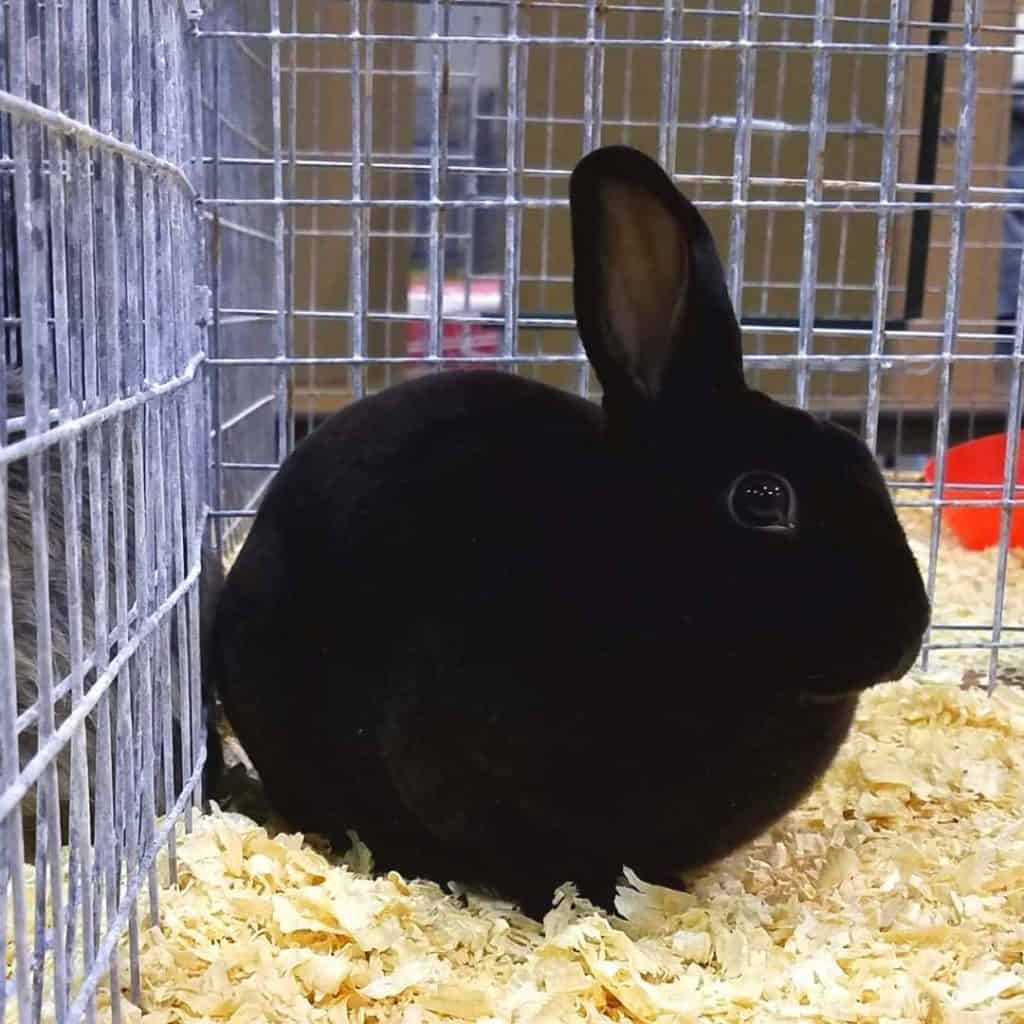
10 Ways To Increase A Rabbit’s Lifespan
In general, your pet rabbit will live longer if they are protected from predators and harsh weather conditions, eat a high-quality diet, live relatively stress-free, get plenty of exercise, and receives proper medical care both preventative and in response to illness or injury.
Now we’ll get more detailed as we talk about some specific things that you can do to help your sweet bunny live longer.
1. A Secure Rabbit Cage Or Hutch
You won’t be surprised when I tell you that rabbits are prey animals that are routinely stalked by predators, even it’s that predator is just the neighbor’s cat.
For your rabbit to live to be an old friend, it has to have a living environment where it’s safe from predators and this applies to both indoor and outdoor rabbits.
For indoor rabbits, if there are any other pets in the house, or even young children, you must invest in a quality indoor hutch that is predator-proof and toddler-proof. We don’t want anyone opening your rabbit’s home who shouldn’t be trusted with your bunny unsupervised.
If you haven’t chosen your rabbit cage or hutch yet, you probably take a few minutes to look at our recommended indoor rabbit hutches and if you’ve already purchased or built a hutch, then you probably should take a few minutes reading this article about cat-proofing your existing cage.
If you are going to keep your rabbit outdoors, it’s even more important that your bunny’s home be secure. There’s no telling what domestic and wild predators might find your bunny when no one is around to chase them off. Keep in mind this includes a wide array of rabbit predators, including mammals, birds, and snakes.
If you haven’t purchased your outdoor rabbit hutch yet, I encourage you to research the omlet egloo rabbit hutch. It’s not going to fit in everyone’s budget, but it’s the most predator secure and weather protective (more on that in a bit) outdoor rabbit hutch I’ve found.
If you have a different hutch, then you need to take some time thinking about making that hutch predator-proof, and you should start with our article about making a rabbit hutch cat-proof.
2. A Rabbit Hutch Protected From Weather
It’s going to seem counter-intuitive, but when I’m talking about a weatherproof hutch, I’m talking about both indoor and outdoor rabbits.
If your rabbit is experiencing extreme heat without features to cool them or extreme cold without features to keep them warm, they are also experiencing stress which can cause illness and a shorter lifespan.
Likewise, if your rabbit is getting wet every time it rains or snows, that has a pretty good chance of getting them sick or causing hypothermia.
If your bunny lives outdoors, make sure their hutch is shaded, protected from cold winds, and water-resistant. Here is an article about outdoor rabbits in the winter and it will help you get your outdoor hutch ready.
If you have an indoor rabbit, you don’t want air vents blowing on them every time the air conditioner or heater comes on. Those swings in temperature are not good for your bunny’s health.
3. Rabbit Socialization
Rabbits are social animals and as a general rule of thumb, they are more likely to live longer and happier lives when they live with friends that they feel a bond. This does not mean, however, that solo rabbits will live lonely and die early.
Rabbits can bond with other pets, including cats, dogs, and even chickens.
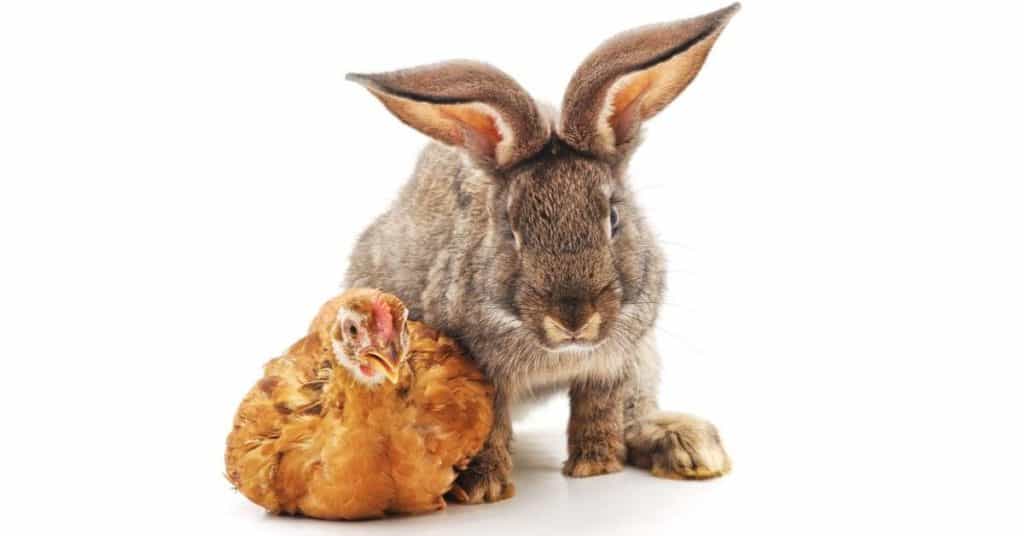
Regardless of what species of friend your bunny has, just having a friend will increase their life expectancy.
Socializing your rabbit with other pets can be challenging and take some time, especially with other pets that are normally predators to rabbits such as cats, dogs, and lions (just kidding…I hope).
When bringing a rabbit into a house with cats or dogs, you must have an integration plan to keep your rabbit safe from your bigger pets. This starts with keeping them apart until they are comfortable with each other.
Also, keep all playtime supervised to avoid any unwanted injuries. Do not ever hold your bunnies while introducing them to other pets, rabbits can kick and if they jump out of your grasp, well you don’t want a chasing match to ensue.
When we are introducing a bunny to other animals, we usually start with the rabbit inside a large and solid dog kennel so that the animals can sniff each other while safely separated. With the rabbit in the kennel, we can have our entire focus on the other pets to help them control their instincts to chase the bunny.
I’m going to go ahead and include a link to Amazon so you can see what kennel we keep around to use when introducing new animals and to isolate a pet when necessary. We like this kennel because it’s strong, folds up for storage when we’re not using it, and ours has lasted for over a decade. { Click Here to see on Amazon. >>> }
P.S. If you decide to get a kennel like this, but the largest that fits your budget. Your bunny is going to feel safer if they can stay in the center of the kennel far away from your dog’s mouth until they decide to venture closer.
But let’s not forget that you can also be your rabbit’s bonded friend and give them the comfort that they might otherwise find with other animals.
You will form a bond with your bunny by spending time. Every bunny is different, so I can’t tell you what your bunny is going to enjoy doing with you.
I always say that rabbits like quiet companionship, you don’t need to play fetch or do long hikes to bond, sometimes just sitting comfortably together in an isolated space far from loud noises will help your rabbit see you as a trustworthy person. And, that’s really what you want; all bunny lovers strive to be included in the bunny “friend zone”
Some bunnies are affectionate cuddlers, others love to learn tricks and enjoy their training time with you. Some simply like to be near you as their protector from unseen dangers. Regardless of how you spend time together, if you make it a priority in no time your rabbit will recognize you and get excited when you come to play.
4. Keep It Chill
Peaceful living arrangements will increase your rabbit’s lifespans because stress and anxiety shorten the lifespan of everything…including people. A rabbit that is comfortable in its surroundings will most likely live a longer life than a rabbit that is constantly stressed out.
If your rabbits live in a household that is constantly bombarded with loud noises and chaos your rabbit will be constantly on guard and ready to flee. In short, they will be constantly stressed out.
Some houses, especially those with small children are naturally loud and chaotic. If this describes your house, you can still have a healthy and happy rabbit by just choosing a quiet part of the house as your bunny’s home.
Choose a rabbit room or bedroom where the kids are not allowed without supervision as your bunny’s home base. You might even consider playing music softly in your bunny’s area to lower their stress level. Here’s a link to an in-depth article about how music is good for rabbits
5. Opt For Indoor Living
Rabbits can absolutely live outside year-round. My family keeps some outdoor rabbits and has for years.
However, keeping your rabbits indoors will increase their life span, assuming that your indoor space isn’t stressful and has climate control.
Outdoor rabbits are more susceptible to attack from predators and the stress associated with the fear of those attacks. In the outdoors, there are more loud noises and an increased potential to get a disease from wild animals.
Outdoor rabbits are also exposed to the dangers of the weather. Extreme heat and extreme cold can be deadly for a rabbit that doesn’t have the necessary protection and resources to thrive in those extremes.
6. Quality Food And Diet
Rabbits need quality food to live a healthy life. Like us, their health is very closely related to their gut health which is directly affected by their diet.
“The best rabbit diet consists of unlimited fresh water, unlimited hay which will make up about 80% of your rabbit’s diet, 15% Salad (Dark Leafy Greens), and 5% of high-quality commercial Pellets or Nuggets. However, the nutritional needs of a rabbit do change at different life stages.”
Stacey & Rebecca – RabbitPros.com
Don’t feed your rabbit junk food, it will shorten their life.
When choosing your rabbit’s food, buy the best quality that fits within your budget. We use and recommend Oxbow Hay and Pellets. If you want to check the current prices of these high-quality rabbit foods, here are affiliate links to each on Amazon; Oxbow Timothy Hay and Oxbow Pellets.
If you want to extend your bunny’s lifespan, you really need to master the ideal rabbit diet. Here is a link to our article about the ideal rabbit diet, you really should take the time to read it.
7. Adequate Exercise
Exercise is essential for keeping your rabbit healthy and happy.
They need to be constantly let out of their rabbit cage to get exercise and to get their pent-up energy spent. Also, boredom can lead to behavioral problems such as chewing.
Once out of their cage, as long as your bunny is in a space where they feel safe, you’re going to be excited to see how happy your bunny is. In no time they’ll be doing their bunny workout which we call binkying.
8. Mental Stimulation
Rabbits are smart animals and they need mental stimulation to be healthy and happy. Mental health matters, even for rabbits.
There are countless rabbit toys and puzzles on Amazon but I’m a big fan of supporting small craftspeople who are making some incredible creative rabbit toys and puzzles. I keep a curated list of the best rabbit toys and puzzles on Etsy and you can find that list by clicking here or you can find all of the best rabbit gear on Etsy here.
9. Spaying and Neutering
There is more to spaying and neutering other than preventing unwanted rabbit pregnancies that might be many and costly for pet owners. Rabbit spaying or neutering is one way to increase your pet’s life span.
Sexually fixed rabbits will prevent them from developing reproductive cancers. Cancers in rabbits are very aggressive and can spread to other organs thus rendering them fatal most of the time. While getting your rabbit fixed is costly (here is a link to an article about the actual cost of getting a rabbit fixed), treating cancer is more expensive.
Also, having your pets fixed will significantly lessen bad behavior that is attributed to raging hormones such as aggressiveness because of reduced territorial instincts and urine spraying.
10. Rabbit Vaccines
This is an odd story because rabbit vaccines are available in Europe but not in the United States. If your rabbit doesn’t come into contact with wild animals, it’s unlikely they’ll ever be exposed to these diseases though there have been times when in-person rabbit shows have been canceled in the USA because of rabbit disease outbreaks in parts of the countries.
All that said, if I had access to these vaccines, I’d give them to all of my rabbits.
There are rabbit vaccines that are available that will help your rabbit develop immunity against common rabbit viruses such as Myxomatosis and Rabbit Hemorrhagic Disease. These diseases are highly infectious and are almost always fatal so having your bunny protected against them will help.
Keeping your rabbits or indoors will also determine if your bunny is susceptible to these diseases. Also, keep on the lookout for any outbreak of rabbit viral diseases in your area as your rabbits can easily get them from contaminated hay.
FAQ Regarding Bunny Lifespan
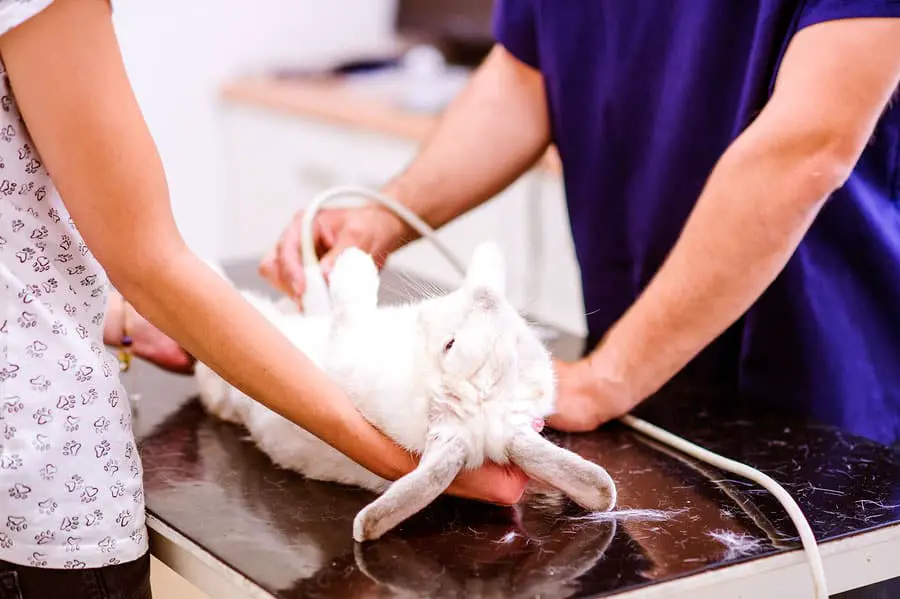
Do Male Or Female Rabbits Live Longer?
There are no definitive studies that demonstrate that a male rabbit lives longer than female rabbits or vice versa. However, there are a number of studies that demonstrate that being spayed and neutered will lead to a longer life regardless of the sex of the rabbit.
I’ve always reiterated the importance of spaying and neutering rabbits in my article. You’ve probably heard your vet recommend it as well.
It is a known fact that unspayed female rabbits over 4 years old have a 50 to 80% chance of developing Uterine Adenocarcinoma. Recent studies have also shown that some rabbit breeds are more susceptible to this kind of cancer such as the Tan, Havana, and Dutch[Source].
Sadly, it is very common for this kind of cancer to spread to other kinds of organs such as the liver and the lungs. These tumors are also known to grow very large that they impede towards the abdomen. When this happens, infection occurs that ultimately is fatal to any rabbit.
Intact Male rabbits on the other hand are 75% more at risk of developing testicular cancers such as Testicular Neoplasia than meal rabbits that have been neutered. This kind of cancer is rare but has been reported in all rabbit breeds. Testicular cancer usually involves the enlargement of one or both rabbit testicles. This kind of cancer can also metastasize to other parts of the rabbit’s anatomy thus making it fatal.
Prevention is always better than cure because aside from having to pay costly veterinary bills you will also save your rabbit from pain and would allow them to live longer lives free of serious illnesses.
What breed of rabbit lives the longest?
There is no definitive data on what breed of rabbit lives the longest. In general, smaller rabbit breeds live longer than the giant rabbit breeds.
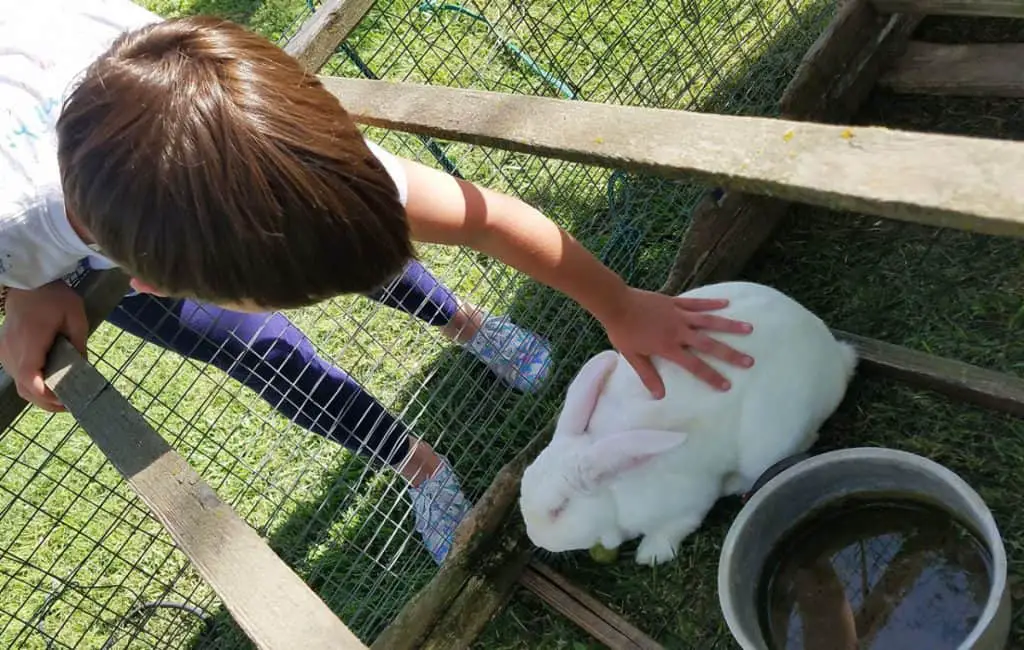
Do Indoor Rabbits Live Longer Than Outdoor Rabbits?
Indoor rabbits live longer lives than outdoor rabbits, and this is true for domestic rabbits and wild rabbits. It is a general rule of thumb that indoor rabbits will live five times longer than outdoor rabbits.
Domestic rabbits live longer lives than wild rabbits. Wild rabbits have a very short life span of 1 to 2 years because they are prey animals in a world of predators and domestic rabbits live 7 to 12 years on average.
Just because indoor rabbits are more likely to live longer lives this does not mean that rabbit that is securely housed in a backyard will not survive. The kind of habitat and living arrangements enjoyed by an outdoor rabbit will largely affect the lifespan of a rabbit.
However, do not ever leave your rabbit in the backyard without any proper hutch based on the notion that they can just roam free and they’ll live a long and healthy life.
If you want to learn more about protecting your outdoor rabbit, here are some related articles right here on RabbitPros.com.
- Article about outdoor rabbit sheds, the ultimate outdoor rabbit house.
- Article about cat-proofing your rabbit hutch.
- Article about outdoor rabbits in the winter.
- Article about the preditors of rabbits.
Finally, if you have the means, we highly suggest the Eglu Go Rabbit Hutch as the best available outdoor rabbit hutch.
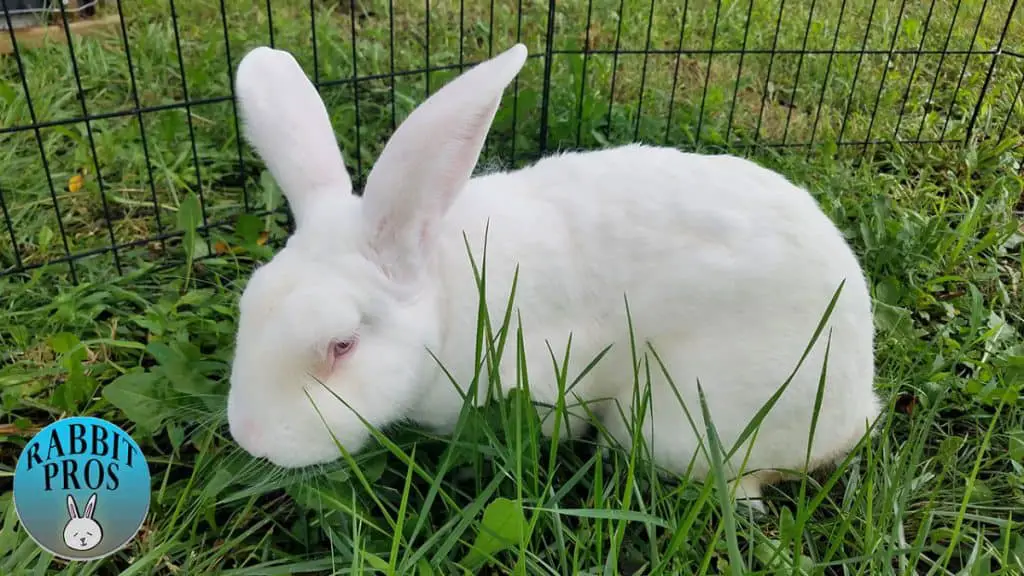
What is the oldest rabbit to ever live?
The oldest domestic rabbit is Mick an Agouti Rabbit that resides in Berwyn, Illinois US. Mick is owned by Riz Lench and has outlasted most of his rabbit peers. He celebrated his 16th birthday last February 9. 2019. Unfortunately, Mick was not able to make it to his 17th birthday because he passed three months later on May 23, 2019.
Mick was described by his owner as a beacon of resilience and positivity in her life. I am equally sure that the entire community of pet lovers also grieve for his loss and wish him all the endless binkies in rabbit heaven.
The oldest wild rabbit was Flopsy who holds the Guinness World Record for the oldest rabbit to ever live. Flopsy was caught in Australia on August 6, 1964. He was 18 years old before he died 10 months later. He was taken care of by L.B Walker in his home in Longford, Tasmania, Australia.
I hope you found this article interesting and that you also found all the answers you were looking for. If you didn’t get your specific question answered, drop me an email after you signup to hear more from me.
~Stacey, your rabbit friend.
